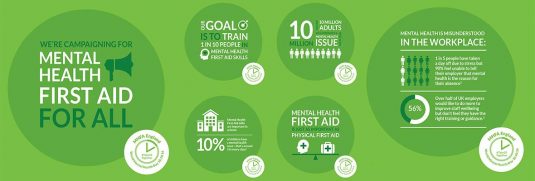Why Mental Health First Aiders are as Important as Physical First Aiders
With the topic of Mental Health rightfully stepping further and further into the spotlight, employers across the country have started to implement the initiative of Mental Health First Aid, ourselves at Streets Heaver included. Last year, four of our employees attended a training course run by MHFA England and returned prepped and ready to provide initial support to fellow employees who may be struggling with their mental health.
As today is Time to Talk Day, we asked some of our wonderful Mental Health First Aiders to share their thoughts on the importance of Mental Health First Aid.
Marv:
As the issue of good mental health in the workplace has increasingly become a concern for employers due to the increase of absenteeism for symptoms of predominantly stress and depression, it is such a benefit for employees to know that there is someone they can go to for initial and impartial advice should they be currently experiencing them. Mental Health First Aiders are on hand to approach employees they are concerned about, to listen with empathy and impartiality, and to offer further third-party support should it be required. They are not there to give longer-term counseling but, as with the ‘physical’ first aiders, Mental Health First Aiders should hopefully be considered the first port of call.
Dane:
Mental Health First Aiders are as important as regular First Aiders because mental ill health can have such a profound negative effect on a person’s life, just as physical ill health can. Around 10 million adults experience a mental health issue every year and this leads to a cost to UK employers of £26 billion. Not only does Mental Health First Aid offer obvious benefits to employee’s health and wellbeing but it can also contribute to cutting employers’ costs too.
The benefits of having a Mental Health First Aider are that they give a deeper understanding of the issues that impact and relate to people’s mental health. They can also teach practical skills that can be used every day, including being able to spot the signs and symptoms of mental health issues, feel confident guiding people towards other areas of support, and also reduce the stigma around mental health.
Alex:

As Time to Change express so clearly with their Time to Talk Day, talking really does have the ability to save lives. Next time you’re feeling low and are struggling with your mental health, reach out to one of your workplace’s Mental Health First Aiders. And if your workplace doesn’t have Mental Health First Aiders, Time to Talk Day seems like a great opportunity to start a conversation about them.
